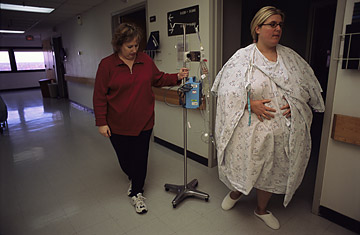
Linda Hay, 314 lb., prepares for gastric bypass surgery in Richmond, Va., in November 2002
It's often considered a last resort for the severely overweight and obese, but gastric bypass surgery can be a lifesaver for one group of overweight patients: those with diabetes. Several recent studies have reported that the surgery not only reduces patients' risk of death — particularly from obesity-related diseases, including diabetes and coronary artery disease — but that in some patients with diabetes the surgery is practically a cure, resulting in normalization of blood sugar, often within days. That's part of the reason that gastric bypass is now the most commonly performed weight-loss surgery in the U.S., with nearly 140,000 procedures done each year.
But a new study introduces a curious wrinkle in the evidence. Led by Dr. Guilherme Campos, director of the Bariatric Surgery Program at the University of California, San Francisco, the study found that gastric-bypass patients with diabetes did not lose as much weight as other patients after the surgery. Of the 310 patients in the study, 92% of those without diabetes were able to lose more than 40% of their excess weight — statistically, that's considered a successful procedure — while only 79% of diabetes patients were able to drop that much weight after one year. In both cases, doctors used the same surgical technique, which involves permanently sectioning off a small pouch from the stomach and connecting it directly to the intestines, which forces patients to eat less and allows food to bypass the rest of the stomach and the upper part of the intestines.
So why the difference in weight loss between the two groups? Campos notes that although the procedure is the same from patient to patient, doctors currently do not use a standard size when creating the new stomach sac. Instead, surgeons use anatomical landmarks unique to each patient to determine the size of his or her new, smaller stomach. But because the stomach lining remains elastic and flexible, sometimes the small stapled-off pouches simply balloon back to a larger size, which explains why 5% to 15% of people who get gastric bypass surgery often experience little or no weight loss.
The other reason for the weight-loss disparity, Campos says, may have something to do with the medications that diabetes patients take to control blood sugar. "One of the known factors for why diabetics have trouble controlling their weight is the types of medications they take," says Campos. "Diabetes is a consequence of being overweight, but [another complication] is having to take medications that add to weight gain. It's a double-edged sword, and a vicious cycle." The solution, he points out, may be to rely on newer anti-diabetes drugs, such as the DPP-IV inhibitors (like Januvia, the first to receive FDA approval), that can help patients keep their blood sugar and weight under control. "We can have even better results in controlling diabetes after gastric bypass surgery if we change the way we manage diabetes until these patients can get off their drugs," he says.
(See photos of what makes you eat more food here.)